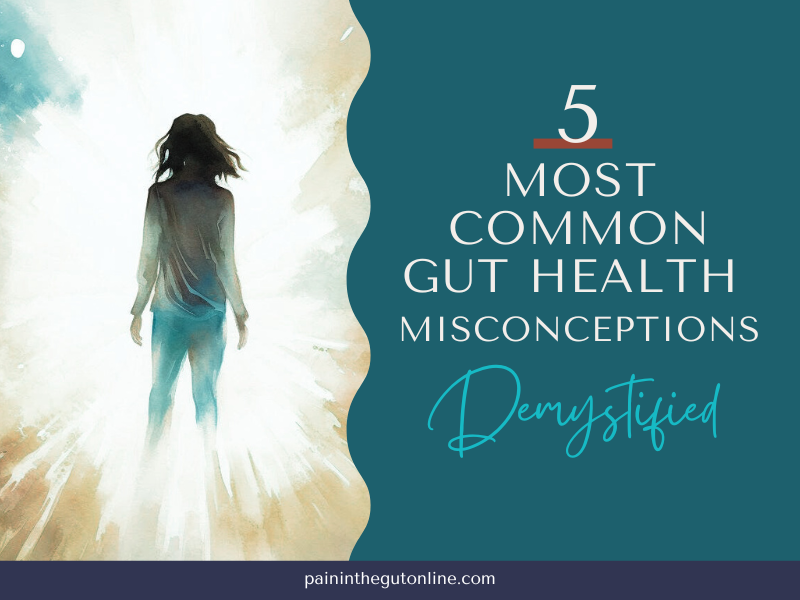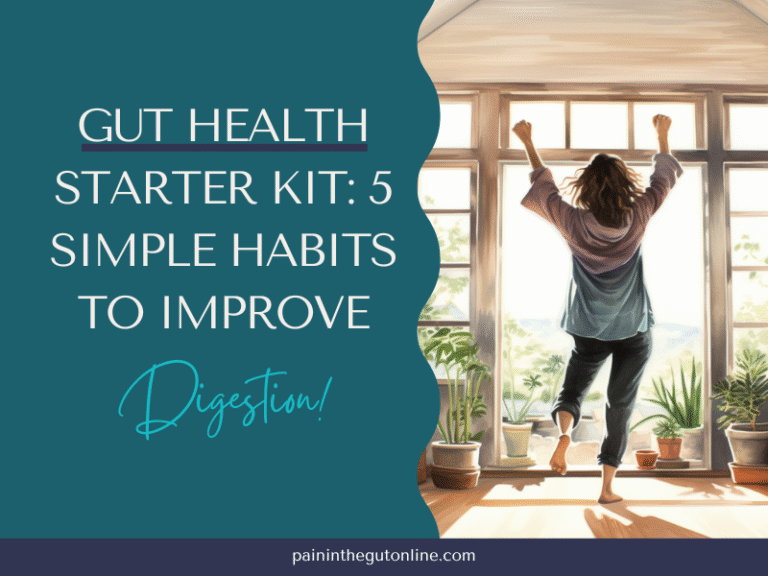COMMON GUT HEALTH MISCONCEPTIONS
6 min read/1,389 words
Don’t be fooled by gut health myths! Unravel the truth behind common gut health misconceptions and take control of your digestive wellness.

Table of Contents
Gut Health Myths Debunked
When it comes to gut health, a lot of misinformation can lead to confusion about what is truly beneficial for your digestion and what is just someone trying to get you to buy something.
Let’s debunk some common gut health misconceptions and separate fact from fiction.
Common Gut Health Misconceptions

1. Spicy Food and Ulcers
One common misconception is the belief that spicy food causes ulcers.
Let’s be clear here: ulcers are typically caused by Helicobacter pylori bacteria, not spicy food. Spicy foods do not directly lead to ulcers. The primary causes of ulcers are the bacteria H. pylori and nonsteroidal anti-inflammatory drugs (NSAIDs, i.e., Advil/Ibuprofen) (Birmingham Gastroenterology).
So, if you enjoy spicy foods, there is no need to worry about them causing ulcers.
2. Bowel Movement Frequency
Another misconception is the belief that you should have a bowel movement every day.
The truth is that there is a lot of variation from person to person. It is considered normal to have bowel movements anywhere from three times a day to three times a week. Diet, hydration, activity level, stress, and age can influence bowel movement frequency.
What is important, however, is to pay attention to any changes in your bowel habits and consult a healthcare professional if you have concerns.
3. Probiotics as Cure-All
This one has really gained traction over the past few years. Probiotics are popping up everywhere as though they are a magical solution that can solve all gut health issues.
And while probiotics can be beneficial for certain gut symptoms and digestive problems, they are not a cure-all for every gut health issue.
It’s important to understand their limitations and use them appropriately.
Probiotics are live microorganisms that can help reestablish a healthy gut microbiome by promoting the growth of beneficial bacteria. They effectively manage specific conditions such as antibiotics-associated diarrhea and irritable bowel syndrome (Russell Havranek). However, they may not be effective for all individuals or all gut-related conditions.
For optimal gut health, it’s important to adopt a holistic approach.
Lifestyle changes such as maintaining a balanced diet, regular exercise, stress management, staying hydrated, regular quality sleep, and mindful drug consumption are equally important in preventing gut health problems.
Probiotics should be seen as a complementary tool rather than a standalone solution.
4. Gluten’s Impact
Another common misconception is that gluten is universally bad for gut health.
While gluten can trigger inflammation in individuals with celiac disease, gluten intolerance, or sensitivity, it is not inherently harmful to the gut for everyone.
Going gluten-free without a medical reason can actually have negative consequences for gut health.
Grains, even those containing gluten, can benefit the gut microbiome due to the fiber they provide. Whole grains, in particular, contain insoluble fibers that act as prebiotics, nourishing beneficial gut microbes.
Eliminating gluten from the diet without proper medical guidance can reduce the number of beneficial bacteria in the gut and lead to a lack of essential nutrients like folic acid, B12, fiber, and selenium.
It’s important to note that if you have celiac disease, gluten intolerance, or sensitivity, you should stick to a gluten-free diet to avoid triggering inflammation and other gut-related symptoms.
Understanding the nuances of gluten’s impact on gut health and seeking advice from your doctor when necessary can help you make informed decisions about your diet and gut health.
5. Juice Cleanses for Gut Health
Before you run out and buy that expensive juicer, check this out.
Did you know your body is designed to eliminate toxins on its own? Thanks to your liver, kidneys, and GI tract, your body does a good job of taking care of those unwanted toxins.
This isn’t to say you can’t support your body’s natural ability through nutrition and lifestyle, just know juicing isn’t necessarily the answer.
Juice cleanses claim to rid your body of toxins and help you lose weight.
Here’s the truth:
No scientific evidence supports the claim that juice cleanses help rid your body of toxins, so just forget that altogether.
And while juice cleanses may temporarily cause you to lose weight, this is only because you are consuming fewer calories and essentially starving your body of the nutrients it needs to function properly.
Another big problem with juice cleanses is that they are high in sugar and low in gut-healthy fiber. Sugar feeds the “bad” bacteria in your gut, while fiber feeds the beneficial ones you want to have in there.
Best Ways to Support Your Gut Health

Now that we’ve debunked the five most common gut health misconceptions let’s talk about tried-and-true ways to support gut health that is even backed by science.
Stress Management
Stress is a common part of everyday life for most people, but it can take a toll on your gut health.
The connection between stress and the gut is often called the gut-brain axis. When you’re stressed, your body releases hormones that can affect the balance of bacteria in your gut, potentially leading to digestive issues and other gut-related problems.
Managing stress is a crucial part of maintaining a healthy gut.
Nutrition
Maintaining a balanced, diverse diet rich in whole, unprocessed foods is the key to supporting a healthy gut microbiome.
While there are certain foods you should definitely include in your diet, such as fermented foods, whole grains, lean proteins, and fresh fruits and vegetables, variety is the most important factor.
If you want to learn more about nutrition and gut health, check out this article.
Movement and Exercise
Regular exercise not only contributes to good heart health and weight control but may also have a positive impact on your gut health.
Research has shown that athletes tend to have a larger variety of gut flora than non-athletes, indicating a more diverse and potentially healthier microbiota.
Physical activity can help stimulate food movement through the digestive system, promoting regular bowel movements and preventing constipation.
I don’t mean run out and sign up for a gym membership (unless, of course, you want to), but do make it a habit to engage in some form of physical activity daily. Start simple with stretching, yoga, or evening walks.
Remember to consult with your healthcare provider before starting any new exercise program.
Staying Hydrated
Hydration is more important for your health than you may realize.
Our bodies need water to function properly. Hydration plays an essential part in regulating temperature and delivering nutrients to cells.
Proper hydration can also help you look younger, feel more energized, and improve your mood.
Aim for eight cups of water a day minimally.
Quality Sleep
While getting your zzz’s, your body is hard at work repairing itself so you can function at your best.
Sleep helps you maintain a healthy weight, fight infection, improve your mental health, and even reduce your risk of injury.
Sleep deprivation can lead to an overproduction of cortisol and hormonal imbalances. Cortisol is the stress hormone that can lead to overeating and food cravings.
If you struggle to get consistent quality sleep, try following a nighttime sleep routine that allows you to wind down an hour before bedtime. Also, be sure to sleep and wake up at the same time each day.
Conclusion
As you can see, understanding and addressing common gut health misconceptions is important if you want to achieve optimal health.
By debunking myths and providing accurate information, we hope to empower you to make informed choices for your digestive health. Remember, a healthy gut is the foundation for overall wellness, impacting everything from digestion to immunity.
With the right knowledge, you can take proactive steps to support your gut and improve your quality of life.
Next Steps
Ready to take your gut health to the next level?

Grab your free guide, “5 Essential Habits to Transform Your Gut Health,” and discover simple, effective strategies to boost your digestion, reduce inflammation, and enhance your overall well-being.
This guide covers all five aspects of gut health: Nutrition, Stress Management, Quality Sleep, Movement, and Hydration.
Sign up for our email list now and grab the guide as a gift as our way of saying thank you!
Start your journey to a healthier, happier gut today!







